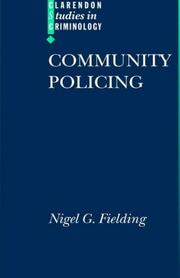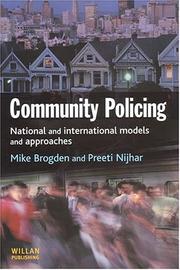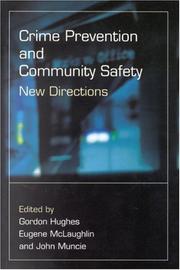| Listing 1 - 10 of 55 | << page >> |
Sort by
|
Book
ISBN: 0191830399 0191092800 0191092819 9780191092817 0198783213 Year: 2020 Publisher: Oxford, England : Oxford University Press,
Abstract | Keywords | Export | Availability | Bookmark
 Loading...
Loading...Choose an application
- Reference Manager
- EndNote
- RefWorks (Direct export to RefWorks)
This work tells the story of how and why neighbourhood policing was originally developed, the ways it has been implemented across different communities and in respect of different crime problems, and what its future prospects are likely to be.
Community policing. --- Community-based policing --- Community-oriented policing --- COP (Community-oriented policing) --- Neighborhood policing --- Policing, Community --- Proximity policing --- Police

ISBN: 1903240174 1903240182 Year: 2002 Publisher: Cullopton Willan
Abstract | Keywords | Export | Availability | Bookmark
 Loading...
Loading...Choose an application
- Reference Manager
- EndNote
- RefWorks (Direct export to RefWorks)
Public administration --- politie --- Personnel management --- Police --- Criminal investigation --- Community policing --- Community-based policing --- Community-oriented policing --- COP (Community-oriented policing) --- Neighborhood policing --- Policing, Community --- Proximity policing

ISBN: 019826027X 9780198260271 Year: 1995 Publisher: Oxford: Clarendon,
Abstract | Keywords | Export | Availability | Bookmark
 Loading...
Loading...Choose an application
- Reference Manager
- EndNote
- RefWorks (Direct export to RefWorks)
Community policing --- -Community-based policing --- Community-oriented policing --- Neighborhood policing --- Policing, Community --- Police --- -Community policing --- COP (Community-oriented policing) --- Proximity policing --- Community-based policing --- Community policing - Great Britain

ISBN: 1134009100 1283966514 1282077392 1134009038 9786612077395 1843925796 9781134009039 9781843925798 9781134009107 1843920069 9781843920069 1843920050 9781843920052 9781283966511 9781282077393 6612077395 9781134009176 Year: 2005 Publisher: Cullompton Willan
Abstract | Keywords | Export | Availability | Bookmark
 Loading...
Loading...Choose an application
- Reference Manager
- EndNote
- RefWorks (Direct export to RefWorks)
Community policing has been a buzzword in Anglo-American policing for the last two decades, somewhat vague in its definition but generally considered to be a good thing. In the UK the notion of community policing conveys a consensual policing style, offering an alternative to past public order and crimefighting styles. In the US community policing represents the dominant ideology of policing as reflected in a myriad of urban schemes and funding practices, the new orthodoxy in North American policing policy-making, strategies and tactic. But it has also become a massive export to non-western
Community policing --- Community policing. --- Community-based policing --- Community-oriented policing --- COP (Community-oriented policing) --- Neighborhood policing --- Policing, Community --- Proximity policing --- Police
Book
ISBN: 1784027995 1452276102 1452276110 9781452276106 9781452276113 9781506307770 1506307779 9781452235295 1452235295 1506318177 9781506318172 9781784027995 Year: 2013 Publisher: Thousand Oaks, California
Abstract | Keywords | Export | Availability | Bookmark
 Loading...
Loading...Choose an application
- Reference Manager
- EndNote
- RefWorks (Direct export to RefWorks)
Originating during police reform efforts of the 1970s, the philosophy of community policing is currently widespread. What sorts of collaborative partnerships have evolved between policing agencies and the individuals and communities they serve? How do police departments engage in systematic examination of identified problems to develop effective responses? How have police departments aligned their organizational structures to best support community partnerships and proactive problem solving? Just how effective have efforts at community policing been? These questions and more are explored in this new reference work.
Community policing --- Police-community relations --- Police --- Public relations --- Community-based policing --- Community-oriented policing --- COP (Community-oriented policing) --- Neighborhood policing --- Policing, Community --- Proximity policing --- E-books --- Crime.
Book
ISBN: 9781593327842 1593327846 1593327625 9781593327620 Year: 2014 Publisher: El Paso
Abstract | Keywords | Export | Availability | Bookmark
 Loading...
Loading...Choose an application
- Reference Manager
- EndNote
- RefWorks (Direct export to RefWorks)
Community policing is in decline, threatened with obsolescence by data-driven practices like COMPSTAT and Intelligence-Led Policing. Efficiency driven and aided by technology, these practices are delivering on the crime reduction promises community policing aspired to. Ray argues that much of community policing's difficulties lie in the lack of a clear theoretical foundation informing its community engagement mandate. The uncritical incorporation of pluralism needlessly highlights the differences between police and community groups. Deliberative democratic theory offers a theoretical foundatio
Community policing --- Community-based policing --- Community-oriented policing --- COP (Community-oriented policing) --- Neighborhood policing --- Policing, Community --- Proximity policing --- Police --- E-books --- Community policing.
Book
ISBN: 9027260206 9027208379 9789027260208 Year: 2021 Publisher: Amsterdam John Benjamins Publishing Company
Abstract | Keywords | Export | Availability | Bookmark
 Loading...
Loading...Choose an application
- Reference Manager
- EndNote
- RefWorks (Direct export to RefWorks)
"Focus group interviews have seen explosive growth in recent years. They provide evaluations of social science, educational, and marketing projects by soliciting opinions from a number of participants on a given topic. However, there is more to the focus group than soliciting mere opinions. Moving beyond a narrow preoccupation with topic talk, Gilbert and Matoesian take a novel direction to focus group analysis. They address how multimodal resources - the integration of speech, gesture, gaze, and posture - orchestrate communal relations and professional identities, linking macro orders of space-time to microcosmic action in a focus group evaluation of community policing training. They conceptualize assessment as an evaluation ritual, a sociocultural reaffirmation of collective identity and symbolic maintenance of professional boundary enacted in aesthetically patterned oratory. In the wake of social unrest and citizen disillusionment with policing practice, Gilbert and Matoesian argue that processes of multimodal interaction provide a critical direction for focus group evaluation of police reforms. Their book will be of interest to researchers who study focus group interviews, gesture, language and culture, and policing reform"--
Community policing --- Police-community relations --- Evaluation. --- Community-based policing --- Community-oriented policing --- COP (Community-oriented policing) --- Neighborhood policing --- Policing, Community --- Proximity policing --- Police --- Evaluation

ISBN: 0761974091 Year: 2002 Publisher: London [etc.] : Sage Publications,
Abstract | Keywords | Export | Availability | Bookmark
 Loading...
Loading...Choose an application
- Reference Manager
- EndNote
- RefWorks (Direct export to RefWorks)
Community policing --- Crime prevention --- Community-based policing --- Community-oriented policing --- COP (Community-oriented policing) --- Neighborhood policing --- Policing, Community --- Proximity policing --- Police --- France --- Pays-bas --- Angleterre --- Nouvelle zelande --- Politique criminelle --- Prevention de la delinquance --- Protection de la jeunesse --- Securite publique
Book
ISBN: 128359739X 9786613909848 0833053256 0833053205 9780833053251 9780833053206 9781283597395 Year: 2011 Publisher: RAND Corporation
Abstract | Keywords | Export | Availability | Bookmark
 Loading...
Loading...Choose an application
- Reference Manager
- EndNote
- RefWorks (Direct export to RefWorks)
Advances in technology and operating concepts are driving significant changes in the day-to-day operations of future police forces. This book explores potential visions of the future of policing, based on the drivers of jurisdiction, technology, and threat, and includes concrete steps for implementation. The analysis is based on a review of policing methods and theories from the 19th century to the present day.
Law enforcement -- Technological innovations. --- Police. --- Police --- Law enforcement --- Social Welfare & Social Work --- Social Sciences --- Criminology, Penology & Juvenile Delinquency --- Technological innovations --- Community policing. --- Community-based policing --- Community-oriented policing --- COP (Community-oriented policing) --- Neighborhood policing --- Policing, Community --- Proximity policing
Book
ISBN: 1911529447 1911529455 9781911529446 9781911529453 Year: 2018 Publisher: Ubiquity Press
Abstract | Keywords | Export | Availability | Bookmark
 Loading...
Loading...Choose an application
- Reference Manager
- EndNote
- RefWorks (Direct export to RefWorks)
Community policing has often been promoted, particularly in liberal democratic societies, as the best approach to align police services with the principles of good security sector governance (SSG). The stated goal of the community policing approach is to reduce fear of crime within communities, and to overcome mutual distrust between the police and the communities they serve by promoting police citizen partnerships. This SSR Paper traces the historical origins of the concept of community policing in Victorian Great Britain and analyses the processes of transfer, implementation, and adaptation of approaches to community policing in Imperial and post-war Japan, Singapore, and Timor-Leste. The study identifies the factors that were conducive or constraining to the establishment of community policing in each case. It concludes that basic elements of police professionalism and local ownership are necessary preconditions for successfully implementing community policing according to the principles of good SSG. Moreover, external initiatives for community policing must be more closely aligned to the realities of the local context.
Development studies --- Emergency services --- Politics & government --- Warfare & defence --- Peacekeeping operations --- Criminal procedure --- Community policing --- Community-based policing --- Community-oriented policing --- COP (Community-oriented policing) --- Neighborhood policing --- Policing, Community --- Proximity policing --- Police
| Listing 1 - 10 of 55 | << page >> |
Sort by
|

 Search
Search Feedback
Feedback About UniCat
About UniCat  Help
Help News
News